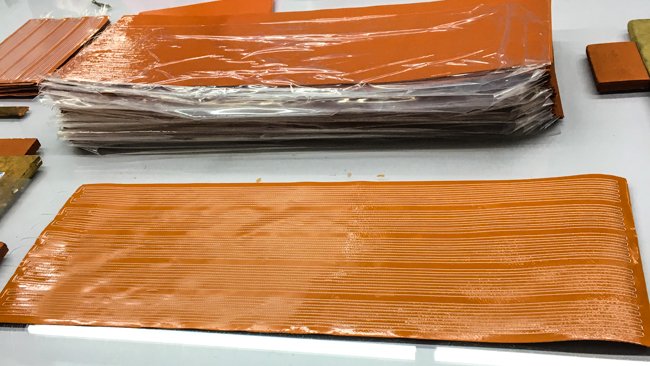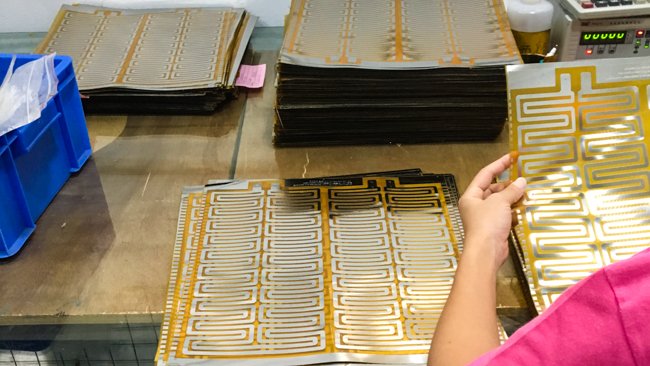Manufacturers requiring localized heating for their applications turn to the advantages of flexible heaters that are mounted to components and equipment. These heaters can provide low level or high-level heat at varying temperatures to offer the appropriate thermal transfer based on the applications.
Heater materials are configurable and customized to fit a multitude of applications. A manufacturer will need to select a heating element that gives the right heat up, balanced thermal distribution, and the ability of multiple watt densities to be located in the flexible heater. Two types of common heating elements consist of wire wound and etched foil.
Wire Wound Elements
A wire wound element consists of a resistance wire in a defined diameter. This wire may have a single strand or consist of several strands that are woven together and placed onto a core of fiberglass. This wire is then vulcanized onto a neoprene substrate or on silicon rubber that has been nylon enforced as the material may range in thickness from 0.032”. The resistance wires are wound into a specific pattern so that they are evenly spaced throughout the substrate layers.

Example of a wire wound element flexible heater being manufactured.
There are a wide range of benefits to wire wound elements. These elements provide a higher level of physical strength, making them ideal for heating applications WHERE there may be abrasive forces on the flexible heater. Flexibility is another key benefit to wire wound flexible heaters. They can handle small radius bends easily as the wire wound can be placed in long patterns for applications that require larger heaters.
Wire wound elements were the original element for flexible heaters and are the suitable choice for manufacturers who are looking for a larger silicone heater. Manufacturers still use this element type today for a variety of applications that include food warming equipment as well as heating piping.
Etched Foil Elements
Etched foil is a newer technology compared to wire wound elements as it has been used in the past 40 years. The main difference of etched foil is that it doesn't consist of a wire. Instead, much like a circuit board, it is a thin alloy metal with resistive qualities that is acid etched into the substrate material. The foil can be as thin as 0.005” and looks similar to aluminum foil. Manufacturers of flexible heaters will have the foil in a rectangular, flat shape that is placed into a pattern with a varying width of at least 0.10”.

Example of an etched foil element flexible heater being manufactured.
Etched foil elements can provide specific advantages to manufacturers who are looking for thinner flexible heaters in applications where size and weight are serious issues. They can be produced for short and long production runs, as these elements allow for higher watt densities and rapid heat up capabilities.
While the etched foil requires wider widths to provide the same wattage and resistance as wire wound elements, the elements can be placed closer together without coming into contact and shorting out. So, the etched foil can be in tighter spaces on the substrate. Lastly, manufacturers can obtain more precise temperature control with complex heat distribution properties.
Certain metal alloys have both thermal conductivity and electrical resistivity that makes them appropriate for use as heating elements. Alloys consist of a base metal with other trace metal elements that are added in a specific process to change the base metal's mechanical, structural, electrical, thermal and conducive properties. The alloy may see an increase in inherent capabilities, such as higher corrosion resistance or electrical conductivity, or provide a decrease of impurities. Alloys that are commonly used in heating elements consist of stainless steel, nickel chromium, copper nickel or Inconel 600.
Stainless Steel 304
Stainless steel 304 is a metal alloy that consists of chromium and nickel as it is also combined with carbon. It can be formed using a variety of techniques, including hydroforming. The main benefits of stainless steel are excellent heat transfer capabilities, corrosion resistance, and ease of fabrication. It has a heat capacity of 20°C and a maximum mechanical temperature of 420°C.
Nickel Chromium
Nickel Chromium has a percentage of nickel and chromium combined. The addition of the chromium provides an increase of electrical resistance as well as corrosion resistance to high temperatures, making the alloy appropriate for wound wire elements due to its ductility and strength. This alloy has a maximum operating temperature of 1100°C and a heat capacity of about 20°C.
Copper Nickel
Copper nickel has incredible corrosion resistance as well as electrical resistance. This alloy is often sought after due to its good machinability. It has a maximum mechanical temperature of 600°C, although it is more suitable for heating elements at 400°C. It also provides a heat capacity of 20°C.
Inconel 600
Inconel 600 alloys are most appropriate for applications that require high corrosion and electrical resistance, and it is also non-magnetic, which makes this alloy ideal for flexible heater elements used with products sensitive to magnetic properties, outdoors, and in wet environments. It contains a combination of nickel, chromium, and some iron. It also offers a high resistance to chemicals. The alloy has a heat capacity of 20°C and a mechanical temperature of 1100°C.
Using The Right Heating Element That Suits Your Application
The best way to select the heating element for the application is to determine the watt density that is needed, what heat transfer and warm up is required, the working environment, and the size of the required heater. If a manufacturer requires large, strong heaters with small bend radiuses and will need multiple watt densities throughout, a wire wound heater can handle the job. For applications where thin flexible heaters that need a fast heat up and good overall heat transfer capabilities are desired, an etched foil element can be used.
Capabilities
Payment Methods
Specials Price
Carriers
Support Hobbyist
Certificate
Customer Support
Follow Us
Tel: 1-905-339-2881
Email: [email protected] , [email protected]
Copyright Gold Phoenix PCB Co., Ltd. 2011 - 2023
Tel: 1-905-339-2881 Email: [email protected] , [email protected]
Quality Control System
|
Products/Service
|
Friendly Links
Copyright Gold Phoenix PCB Co., Ltd. 2011 - 2023


